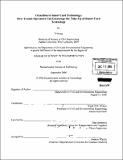Transition to smart card technology : how transit operators can encourage the take-up of smart card technology
Author(s)
Hong, Yi, S.M. Massachusetts Institute of Technology
DownloadFull printable version (16.51Mb)
Other Contributors
Massachusetts Institute of Technology. Dept. of Civil and Environmental Engineering.
Advisor
Nigel H.M. Wilson.
Terms of use
Metadata
Show full item recordAbstract
This thesis explores and evaluates the essential strategies needed for transit agencies to switch from traditional fare collection systems to smart cards. More transit agencies today are investing in smart card technology as part of their new automated fare collection (AFC) systems. Although the benefits of switching to smart card systems have been well-researched and acknowledged by transit agencies, it is unclear how a transit agency should go about implementing a smart card system in order to achieve optimum customer acceptance and to reap maximum benefits from the system. Recent experience has shown that a range of implementation policy decisions can go a long way towards speeding or slowing down the adoption of the technology by customers. A case study approach is used here to identify and evaluate the effectiveness and impacts of policies used by five transit agencies that currently employ smart cards. These policies fall into two categories: 1) distribution, operational and usage policies, and 2) fare policies. Distribution, operational and usage policies must be designed to facilitate and enhance customer adoption of smart cards, especially in the case where alternative fare media will co-exist. (cont.) Fare policies are designed to differentiate smart cards from other fare media through differential pricing strategies, frequent-use bonuses and low price guarantees. The thesis also examines the use of fare models in assisting transit agencies to predict ridership and revenue, especially focusing on the features needed in these models to predict the usage rates of smart cards and their associated unique fare options. Finally, the findings from the research are integrated and used to develop a set of guidelines for use by a transit agency that is switching to a smart card fare payment system. The main topics of these guidelines were identified as: 1) the use of fare policy incentives, 2) balance between restrictions and alternatives with respect to co-existing fare media, 3) accessibility to smart card support services, 4) capitalizing on the superiority of smart card technology, and 5) the use of a single card. To illustrate the usefulness of the guidelines, they were applied to a case study of the Massachusetts Bay Transportation Authority (MBTA)'s new AFC program, the CharlieCard.
Description
Thesis (S.M.)--Massachusetts Institute of Technology, Dept. of Civil and Environmental Engineering, 2006. Includes bibliographical references (p. 181-184).
Date issued
2006Department
Massachusetts Institute of Technology. Department of Civil and Environmental EngineeringPublisher
Massachusetts Institute of Technology
Keywords
Civil and Environmental Engineering.